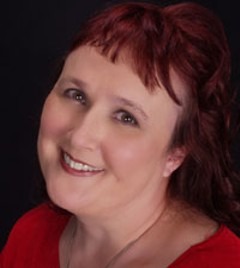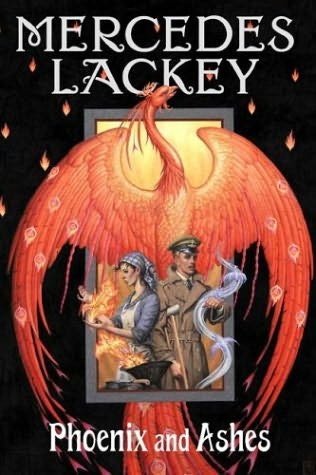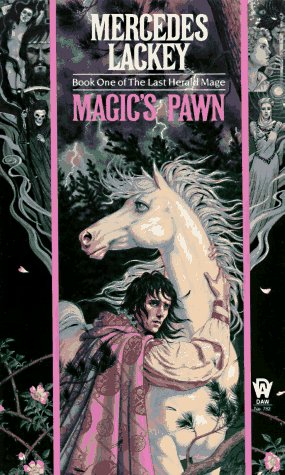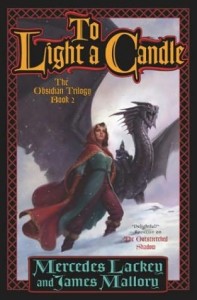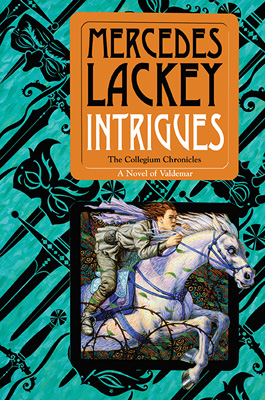Mercedes Lackey is the New York Times bestselling fantasy author behind the Valdemar series, The Elemental Masters series, the 100 Kingdoms series, and many, many more. She has published over 100 novels in under 25 years.
Byrt: First off, you are an amazingly prolific writer – what is your daily writing routine like? How do you balance discipline and creativity?
ML: Well once I get done with the email, I settle right down into writing. That’s generally between 2 and 4 PM. If we don’t have stuff we need to take care of, that is. Then around 8ish I break for a little gaming — City of Heroes MMORPG — and after that go back to the writing. Larry and I have dinner with some of the birds around 11ish — sometimes the birds even let us have some — and a little TV, prerecorded stuff mostly. Then I go back to writing until I can’t keep my eyes open anymore.
I don’t think that discipline and creativity are exclusive. I think you HAVE to have discipline, or you aren’t really creative, just scatterbrained.
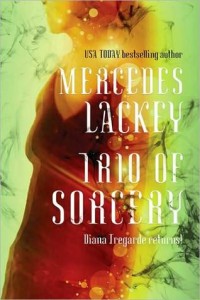 Byrt: For Trio of Sorcery, your three novellas, you’re revisiting some characters you haven’t written about in years/decades – what was it like, writing them again after so long? Has the explosion of Urban Fantasy influenced these stories at all? And given UF’s current popularity, do you think you’ll write more books based on these characters?
Byrt: For Trio of Sorcery, your three novellas, you’re revisiting some characters you haven’t written about in years/decades – what was it like, writing them again after so long? Has the explosion of Urban Fantasy influenced these stories at all? And given UF’s current popularity, do you think you’ll write more books based on these characters?
ML: Well it was really nice to get back to Diana and Jenny; the real challenge was that when I left them it was literally another world than it is now. So I had to rev up the way-back machine and remember what things were like back then. Even more so with Diana, since I was doing a prequel, back when she was in college. And then it occurred to me that “back then” really is a foreign area for readers these days, so I figured I had better do introductions to the novellas to get the readers up to speed.
If there is any influence from the current Urban Fantasy writers on those novellas, I think it might be both my own maturity and the work of Jim Butcher (who I think is a genius). Diana (and to an extent, Jenny) tended to whine a little. I’d like to think they’ve both cowboyed up under the Harry Dresden influence.
The reason I didn’t write more Diana was not because I didn’t want to, it was because of another issue altogether. That issue has long since been resolved, and if this book does well I am more than open to doing more and longer work with any of the three gals. The big challenge, of course, will be to decide whether to just reboot the whole storyline into the modern era, write it as nostalgia pieces, or try and figure out how someone who is 50-something could do what Diana and Jenny need to do….
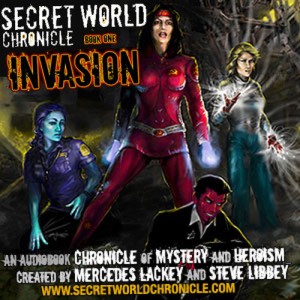 Byrt: For those who don’t know, what is the Secret World Chronicles? What inspired you to get into the podcasting world? Are there different creative challenges in writing podcasts?
Byrt: For those who don’t know, what is the Secret World Chronicles? What inspired you to get into the podcasting world? Are there different creative challenges in writing podcasts?
ML: The Secret World Chronicles is currently a series of podcast stories in a braided novel series created by me, Steve Libbey, Cody Martin, Dennis Lee and Veronica Gugiere. It’s superhero fiction in our own setting, it’s been sold to Baen and the first paper book will be out in March.
When we got the idea to do this series, it was Steve that suggested we podcast it to build an audience in order to show a publisher that we actually had a market for this sort of thing, since I am not exactly noted for my superhero fiction.
Baen is taking a bit of a risk with this one, and I am very grateful to them for that. And yes, I am sure that comic fans will be going “But MegaMan did that in ‘AstroStories 27’ back in 1972.” It is very difficult, if not impossible, to create new “gimmicks” in superhero fiction. But my writing has always been character driven and these are very character driven stories. The point is not new superhero gimmicks, the point is how these people, blessed or cursed by powers, and driven by — quite often — the things that are most broken inside them, cope with what is being thrown at them and how they are thrown together. I really love these characters, not just mine, all of them.
Honestly, I hadn’t noticed much difference in writing for podcast. The real challenges I suspect come to our voicer and fellow writer Veronica. Especially when I start throwing Russian phrases into the mix.
Byrt: On your blog you talk about the music you write to – are there any composers or soundtracks you find yourself always going back to? Or does each project create a soundtrack of its own?
ML: Oh gosh yes. I use a lot of movie soundtracks, so Mark Mancina, James Horner, Trevor Jones, Randy Edleman, Klaus Badelt, Michael Kamen…a very long list. And I use a lot of classical composers, Mahler, Rachmaninov, Tchiakowsky, goodness, nearly all the Russians in fact, and modern classical composers like Hohvaness. I’m not an expert by any means, but I can usually name a composer within a bar or two of a piece being played, so often I know exactly what mood I want and can cue up the music for the scene. When I don’t need anything in particular, I just have the local classical station playing, which is how I discover new stuff.
I’d say on the whole though, my go-to guys tend to be movie soundtracks. Modern movie composers are extremely good at setting a mood and doing thematic music, and that is sometimes just what I need.
Byrt: There’s been a lot in the news lately about bullying and homophobia, and the It Gets Better project. Magic’s Pawn was the first book I read that had a gay protagonist (and that book still can make me cry). What inspired you to write about Vanyel? What was the reception, back in 1989, to Magic’s Pawn? And do you think books play an important role in promoting tolerance?
ML: I have a lot of gay friends, and what occurred to me was that they’re friends and (insert career here), and (insert religion here) first and anything else second. And really, since very few people I know go around flouncing into a room and screaming “HI THERE! I’M GAAAAAAAYYY!” that should be how I wrote Vanyel — someone who is a psychologically abused kid who happens to be gay. You know, just one more thing to get beat up over….
Honestly I have to say that doing a book with a gay protagonist in 1989 was just not that big a deal in SF/F. Samuel Delaney had, Marion Zimmer Bradley had, the SF/F community has always been very open minded and the book itself didn’t sell well enough to get noticed by the Hate Crowd. I almost wish it had. I was going to offer them volume discounts for their book burnings. Shoot, one or two good book burnings could have given me New York Times Number One rank!
OK, joking aside, part of the point was this; gay kids are imaginative kids and imaginative kids are naturally drawn to speculative fiction. I wanted to write a book for them that did for them what Ted Sturgeon’s Saucer of Loneliness did for me–tell them “No, you are not bad, you are not crazy, and you are not alone.” Seems to have done that.
As for books promoting tolerance, I would have to give that a maybe. You are not going to change the mind of anyone who has already made up his mind about something with a book. What you might do, if you are lucky, if you catch people at the right time and in the right way (and when they are young enough), is cause that crack in what might be a closed mind to open up and let in some light.
Byrt: You’ve collaborated with many different authors over the years – Andre Norton, Marion Zimmer Bradley, Rosemary Edghill, and James Mallory, to name a few. How long does it take to adjust to a new writing partner? What are some of the challenges? Who was the biggest surprise?
ML: Since most of the people I have collabed with are friends, it generally hasn’t taken long at all to adjust to each other. And I’ve got a pretty flexible attitude to writing, I believe that partnerships should be exactly that, everyone gets a say. The challenges used to be in sheer coordination, nowadays when you can use Google Docs to have both of you writing in the same document at the same time it is much, much easier. That kind of collaborative writing is how we have done ALL of SWC so far.
I’d say the biggest surprise was Eric Flint and Dave Freer. I was very skeptical when Jim Baen proposed them as co-writers, but when I finally met them, I was blown away. They are both terrific guys with great strengths that are quite different from my own.
Byrt: Speaking of James Mallory – was The Obsidian Mountain trilogy inspired by Tolkien? And was it daunting to write a story about elves, knowing it would be compared to J.R.R.?
ML: No, actually The Obsidian Mountain was inspired by music — my Russian classical and modern composers. I’ve had some of those scenes in my head for decades. It actually started with Stravinsky’s Rite of Spring and Idalia invoking the Wild Hunt, and Stravinsky’s Firebird for the end.
It honestly never occurred to me that anyone would compare our work to Tolkien. I mean, these days, you can’t toss a penny at a bookcase in the F/SF section without hitting an elf.
Byrt: Could you maybe tease a little bit about what’s coming up next in the Elemental Masters series? (Will we be seeing Sarah Jane and Nan again?) And maybe a little bit about what’s coming up in the third book in the Collegium Chronicles? (Will Mags learn more about his family?)
ML: Next Elemental Masters book is based on the fairy tale “Donkeyskin” (the same fairy tale as “Tattercoats”), and it’s giving good old Peter Almsley his very own book. It also involves the beginning of WWI. And walking dead….
The third book of the Collegium Chronicles is about that awkward point where a person is ready for adult responsibilities, but the adults around him are still looking at him as a kid. And Kirball. And secrets.
Byrt: And what other projects are on your horizon?
ML: Next 500 Kingdoms book, which is based on Beauty and the Beast crossed with Red Riding Hood. And werewolves. And a novel for Tor about Princess Elizabeth (who became Queen Elizabeth I) as a hunter of vile creatures of the dark. The YA series for Tor, The Shadow Grail, as our heroes try and figure out who is the enemy, who is a friend, and if they can trust anyone at all, even each other. And East of the Sun, which is a sort of YA Deadwood book.
Byrt: Lastly, have you read any good books recently that you’d recommend?
ML: The Parasol Protectorate books by Gail Carriger. The Hunger Games books by Susanne Collins. Anything by Peter Beagle and Charles de Lint.
Thanks again to Mercedes Lackey for stopping by the Bookyurt!
For more on Mercedes, you can find her website here.
(And our review of Intrigues is here.)
